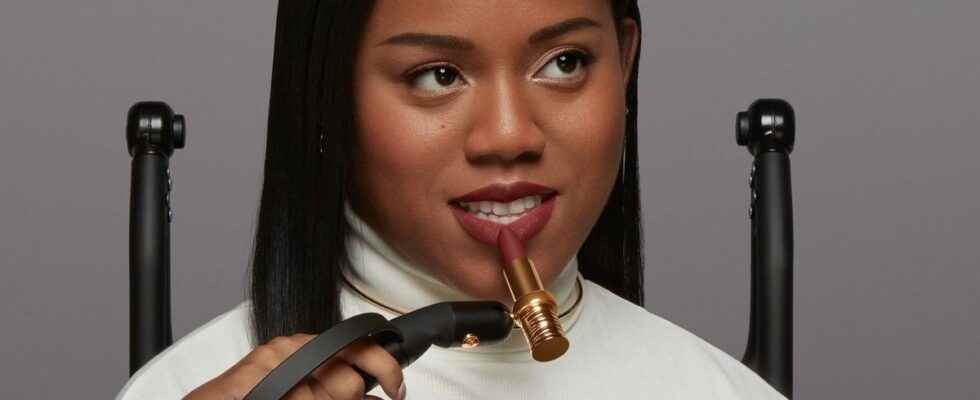Published on
Updated
Reading 4 mins.
Put on lipstick. A banal gesture for some which can however prove to be restrictive for others, whether they have reduced mobility of the arm or the hand. But the cosmetics sector intends to make up for this lack with the help of new technologies, and to finally make make-up accessible to everyone. Explanations.
Long forgotten by brands in all sectors, people with disabilities finally seem to emerge from invisibility. After the fashion industry, which is trying through timid but very real launches to offer more inclusive clothing, it’s the beauty industry’s turn to reinvent itself to allow as many people as possible to take care of themselves. of her skin, and above all to make the make-up experience easier and more pleasant. A trivial thing for many, but which turns out to be much more difficult for what is called the largest minority in the world.
More than a billion people today live with some form of disability, i.e. nearly 15% of the world’s population, according to WHO, and if not everyone has difficulty applying makeup, many are those for whom, due to reduced mobility, applying mascara or lipstick can be an obstacle course. But new technologies could quickly change the game. While beauty tech has until now essentially been at the service of personalization and online sales, it is also proving essential to make beauty more inclusive. Witness the latest innovation presented by a giant in the sector at the Consumer Electronics Show (CES) in Las Vegas, which opened its doors this Thursday, January 5.
“Smart moves”
The strike force of social networks is such that today it pushes brands to get involved on all fronts, especially social and environmental ones, under penalty of seeing their favorite targets escape to other horizons. As a result, many sectors, including fashion and beauty, are working to be ever more inclusive. L’Oréal is one of the cosmetics players who have been committed for several years to making disability visible, through numerous programs, but also its muses and spokespersons L’Oréal Paris, including Aimee Mullins since 2011, but also Bebe Vio and Marie Bochet.
As part of CES 2023, the group is taking another step towards inclusiveness with the presentation of an innovation intended to facilitate the beauty experience for people with reduced mobility. Called HAPTA, this takes the form of an “intelligent, portable and high-precision make-up applicator” which should allow people with reduced mobility of the arm or hand to apply lipstick with more ease.
Currently under development, this applicator should be equipped with technology created by the American company Verily, designed to allow people with reduced mobility “to use [des] covered more stably“. The connected and portable device is based on a “combination of intelligent movements” able to reproduce those of a make-up routine via all kinds of customizable accessories. This can range from “handling packaging” to “precise application [d’un] product” such as mascara or lipstick, for example.
“HAPTA is equipped with a magnetic attachment that rotates 360 degrees and offers 180 degree flexibility, for ergonomic and easy use. A ‘click’ function allows you to intuitively set the desired position, hold it during use and lock the setting for later use. [L’applicateur] comes with a built-in battery allowing continuous use for one hour“, details L’Oréal in a press release.
A first step towards inclusiveness
Admittedly, the beauty industry is still very little open to disability. In 2019, a few months before the start of the Covid pandemic, the Grace Beauty brand stood out for having launched a series of accessories intended to facilitate the application of mascara. The idea? Three different handles to allow people with reduced mobility to optimize their makeup experience. Innovations that had caused a stir, but which probably did not allow the brand in question to gain visibility, its last publications on social networks dating from April 2019 and its e-shop no longer being accessible.
At the initiative of a couple, Laurent and Sophie, the Dulcenae well-being and beauty institute has also contributed to making beauty more inclusive, welcoming men and women who do not feel like pushing the doors of a classic institute, because it does not embrace the famous standards of an industry that struggles to break certain stereotypes. Here it is socio-beauticians who deliver personalized care to each client, whatever their problem and need, with the aim of offering them a moment of relaxation and well-being, but also to improve their self-confidence. self. A place that welcomes everyone, but is particularly open to those who have a physical disability, an illness, a skin problem such as eczema, or who are overweight or obese.
Still rare, these initiatives nevertheless testify to the need to make beauty more inclusive, on a very large scale. L’Oréal’s makeup applicator is another step in this direction. It will be launched later this year via one of the group’s flagship brands, Lancôme, initially as a lipstick applicator. “Other make-up applications will be offered later,” said the cosmetics giant.
